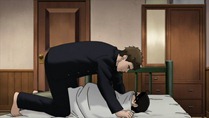 |
 |
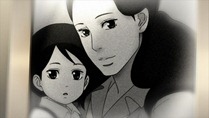 |
“Realism” is a term that gets thrown around almost as much as “slice-of-life”, and likewise incorrectly most of the time – but Sakamichi no Apollon is that rare series that earns the descriptor.
I can see where this episode might not be to everyone’s tastes, because it was certainly the least flashy of the five so far. I commented last week, though, on Watanabe Shinichiro’s ability to do a lot while seeming to do very little, and I think it strongly applies here. There was very little overt “direction” in this episode at all – all Watanabe-san did was effectively turn the cameras on his principals and watch them go through some important but subtle self-discovery in a completely non-sensationalistic manner. Not only was this “realism” is the true sense of the term, but even slice-of-life – because he literally made us feel as if we were eavesdropping on a short but important section of Kaoru’s life. Watanabe-sensei has become, in a sense, the anti-Shinbou.
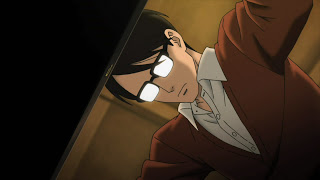 Given all that, “Lullaby of Birdland” doesn’t lend itself to discussion as the previous eps did, which makes my job as a blogger harder even if it’s just as easy to be a viewer. If I were to use one word to describe the episode it would be “lovely” – perfect little snapshots that added up to a rich experience without any flash or grand moments. For example, the short scene where Kaoru played with Sentarou’s sister Sachiko (15 year-old Miyamoto Yume, who played young Monami in the underrated gem Capeta) was quietly brilliant – a lot of credit goes to the mangaka here, I’m sure – as Kaoru treats it as both an excuse not to face Ritsuko and a therapy session. When Ritsuko commandeers the tin-can telephone to gently break Kaoru’s heart as Sentarou eavesdrops, it highlights the fact that all three of them are stuck at that perilous stage between child and adult, wrestling with feelings none of them are really equipped to understand yet.
Given all that, “Lullaby of Birdland” doesn’t lend itself to discussion as the previous eps did, which makes my job as a blogger harder even if it’s just as easy to be a viewer. If I were to use one word to describe the episode it would be “lovely” – perfect little snapshots that added up to a rich experience without any flash or grand moments. For example, the short scene where Kaoru played with Sentarou’s sister Sachiko (15 year-old Miyamoto Yume, who played young Monami in the underrated gem Capeta) was quietly brilliant – a lot of credit goes to the mangaka here, I’m sure – as Kaoru treats it as both an excuse not to face Ritsuko and a therapy session. When Ritsuko commandeers the tin-can telephone to gently break Kaoru’s heart as Sentarou eavesdrops, it highlights the fact that all three of them are stuck at that perilous stage between child and adult, wrestling with feelings none of them are really equipped to understand yet.
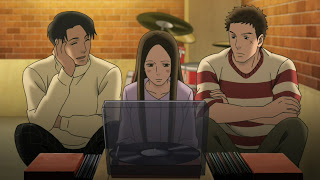 The fallout from Kaoru’s confession and kiss was certainly still being felt this week, acting as a wedge to drive Karou away from the shop and the studio as he deals with his pain. Meanwhile Brother Jun continues to flirt with Yurika and we’re left to wonder just what goes into the intense curiosity Sentarou has about who Ritsuko likes enough to turn down “Bon”. Does he not realize the feelings she has are for him – is she that dense? And does he feel the same way about her, despite his crush on Yurika? I like that this messy pentangle isn’t the obsession of the show, but is never far from our minds – because it’s never far from Kaoru’s. Of all the potential pairings, Sentarou and Ritsuko is still the simplest and the one that makes the most sense, especially given that Kaoru is likely to end up leaving again in the end. But this is not the main theme of “Sakamichi” – in its own words, “Unlike love affairs, friendship is for life.”
The fallout from Kaoru’s confession and kiss was certainly still being felt this week, acting as a wedge to drive Karou away from the shop and the studio as he deals with his pain. Meanwhile Brother Jun continues to flirt with Yurika and we’re left to wonder just what goes into the intense curiosity Sentarou has about who Ritsuko likes enough to turn down “Bon”. Does he not realize the feelings she has are for him – is she that dense? And does he feel the same way about her, despite his crush on Yurika? I like that this messy pentangle isn’t the obsession of the show, but is never far from our minds – because it’s never far from Kaoru’s. Of all the potential pairings, Sentarou and Ritsuko is still the simplest and the one that makes the most sense, especially given that Kaoru is likely to end up leaving again in the end. But this is not the main theme of “Sakamichi” – in its own words, “Unlike love affairs, friendship is for life.”
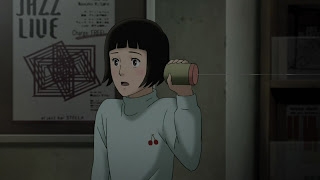 Surprisingly low-key is the entrance of Kaoru’s Father (Terasoma Masaki) into the story at last – and he’s not the only parent we’re to meet, either. The interaction between father and son is too brief to draw many conclusions, except that Dad seems like a supportive and understanding sort. His main role here is to pass along the info that a former housekeeper has crossed paths with Kaoru’s mother in Tokyo, and gotten an address. Kaoru’s hesitation is understandable, especially considering how deeply he’s mired in his own heartbreak over Kaoru, but Sentarou’s interference is predictable. From his perspective not going to see his mother would be an unforgivable act by Kaoru – because it’s something he could never do himself, even if he wanted to.
Surprisingly low-key is the entrance of Kaoru’s Father (Terasoma Masaki) into the story at last – and he’s not the only parent we’re to meet, either. The interaction between father and son is too brief to draw many conclusions, except that Dad seems like a supportive and understanding sort. His main role here is to pass along the info that a former housekeeper has crossed paths with Kaoru’s mother in Tokyo, and gotten an address. Kaoru’s hesitation is understandable, especially considering how deeply he’s mired in his own heartbreak over Kaoru, but Sentarou’s interference is predictable. From his perspective not going to see his mother would be an unforgivable act by Kaoru – because it’s something he could never do himself, even if he wanted to.
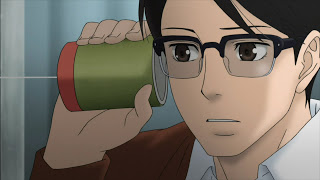 Again, Watanabe treats the reunion of mother and son – a potentially explosive event – with surprising understatement and restraint. Mom works at “Blue Butterfly”, which can only be a kyabakura, a hostess club – not a highly respectable place, though not as disreputable as most Westerners (who likewise might think Geishas are prostitutes) might assume. After a brief visit to Jun’s dorm reveals that Brother J. is both a confirmed womanizer and has been “missing” for a month – and a mixup that has the college guys drinking water and the high-schoolers shochu – Kaoru and Sen return to the club (slightly hung-over) to meet Mom. Part of me felt that Sen was being pretty rude by intruding on this moment, but he at least had the grace to excuse himself after lunch, and in his own mind I’m sure Kaoru was grateful for the support.
Again, Watanabe treats the reunion of mother and son – a potentially explosive event – with surprising understatement and restraint. Mom works at “Blue Butterfly”, which can only be a kyabakura, a hostess club – not a highly respectable place, though not as disreputable as most Westerners (who likewise might think Geishas are prostitutes) might assume. After a brief visit to Jun’s dorm reveals that Brother J. is both a confirmed womanizer and has been “missing” for a month – and a mixup that has the college guys drinking water and the high-schoolers shochu – Kaoru and Sen return to the club (slightly hung-over) to meet Mom. Part of me felt that Sen was being pretty rude by intruding on this moment, but he at least had the grace to excuse himself after lunch, and in his own mind I’m sure Kaoru was grateful for the support.
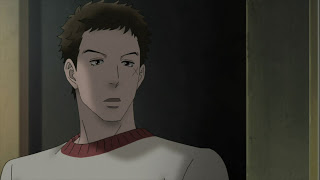 The conversation between the son and the woman who abandoned him is restrained and almost subdued – she obviously feels terribly guilty, and he can’t quite bring himself to ask the question that’s the only one that really matters to him. But there’s an understanding of a sort between them, and a hint of future meeting – in fact Kaoru asks his mother (a singer) to learn “Lullaby of Birdland”, a classic jazz ballad performed by many legends (this is the well-known recording he gives her) so that he might accompany her on it the next time they meet. And with that, the meeting is over and Kaoru and Sen are off to Kyuushu again – with only a few quiet tears shed by Mom for pure drama.
The conversation between the son and the woman who abandoned him is restrained and almost subdued – she obviously feels terribly guilty, and he can’t quite bring himself to ask the question that’s the only one that really matters to him. But there’s an understanding of a sort between them, and a hint of future meeting – in fact Kaoru asks his mother (a singer) to learn “Lullaby of Birdland”, a classic jazz ballad performed by many legends (this is the well-known recording he gives her) so that he might accompany her on it the next time they meet. And with that, the meeting is over and Kaoru and Sen are off to Kyuushu again – with only a few quiet tears shed by Mom for pure drama.
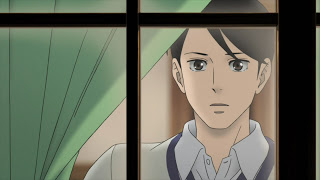 I can see where some viewers might have wanted more emotion here, and out of the ep in general – but that doesn’t seem to be the style of either Watanabe or Kodama-sensei, who’s shared sensibility makes Watanabe a seamless choice to direct her manga. There are really three separate relationship explorations happening here – first loves, parents and children, and male friendship. And none of them dominate the story at the expense of the others, though ultimately it’s Kaoru and Sentarou’s relationship that’s the essence of what the series is about. And in depicting emotions, as with the character and plot elements, the series is more concerned with balance than bombast.
I can see where some viewers might have wanted more emotion here, and out of the ep in general – but that doesn’t seem to be the style of either Watanabe or Kodama-sensei, who’s shared sensibility makes Watanabe a seamless choice to direct her manga. There are really three separate relationship explorations happening here – first loves, parents and children, and male friendship. And none of them dominate the story at the expense of the others, though ultimately it’s Kaoru and Sentarou’s relationship that’s the essence of what the series is about. And in depicting emotions, as with the character and plot elements, the series is more concerned with balance than bombast.
 |
 |
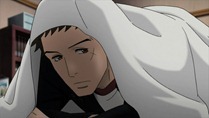 |
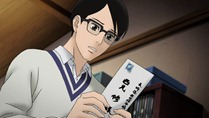 |
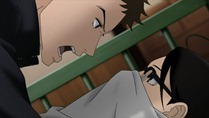 |
 |
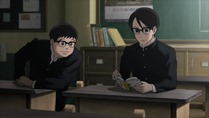 |
 |
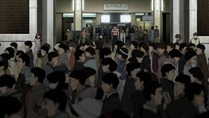 |
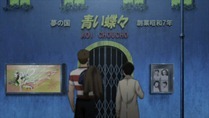 |
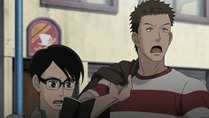 |
 |
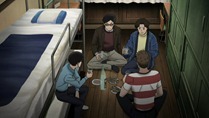 |
 |
 |
 |
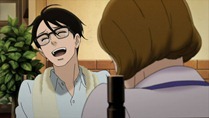 |
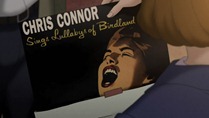 |
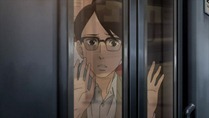 |
 |
 |


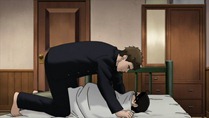
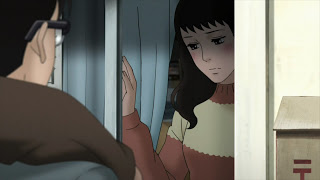
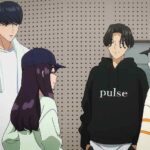

Anonymous Me!
May 11, 2012 at 12:55 amman, they are rushing this so much now that it'd be better not think about the original source manga now. This anime could've been a classic, had it been give a little more time to fully tell the story. However with just 12 episodes to tell 9 volumes, more stuff get dropped entirely and storytelling actually start to get affected a little. For instance, the table talk between Richie and his mom have become just a lighthearted affair when dropping "the heavy back-story mom tells him when he asked her why she left him" completely.
I wasn't bothered too much about omission here and there early in the going (it'd be silly to expect anime to be carbon-copy of manga), but it's getting more or more noticeable.
But having said that the anime is still pretty good and I will continue to watch it. Just I am getting more convinced that it would have been so much better had it given like 6 more episodes, so that they wouldn't have to rush/cut so much in the middle when a lot of important storytelling/development happens. Yes, it's only 5 episodes in, but I know the pacing of anime (about 3/4 volume per episode) by now.
Anonymous
May 11, 2012 at 7:10 am>"I can see where some viewers might have wanted more emotion here, and out of the ep in general"
It's not more emotion I was asking for – actually, in the manga it happens in the same, restrained way. I expected them to do *something* with Kaoru's mother. This way it was like a meeting of mother and son who haven't seen each other in a few years at most, and not like a child who has grown up with the knowledge that his mother abandoned him meeting his mother for the first time in more than 10 years. Not to mention how unbelievable it is that Kaoru wouldn't even ask the very obvious questions (why did you leave me, why didn't you at least write, etc).
Reconnecting with an estranged family member (mother) is a heavy issue – but here they dropped the heavy and used the situation to make Kaoru feel better. It just felt weightless and ultimately pointless, and the execution almost mechanical. Why use such a character and such a situation if you're not going to do anything with them? It would've been better if they cut the whole episode with the mother and used the time to expand on some stuff, or lay the groundwork for some future events.
The anime is still very good, but the rush is starting to become very obvious, this is the second time when I feel a heavy scene was made too light by the writing cutting too much. And while the mother episode is fairly irrelevant in the long run, this kind of predicts heavy and important stuff getting either dropped or rushed through in the future. :/
admin
May 11, 2012 at 7:34 amI don't know why you think that question would be so easy to ask, but I could very easily see Kaoru (or anyone) not having the courage to ask it in their first meeting. Murakami write an entire novel (Kafka on the Shore) that's basically about this question, and the MC never actually manages to ask it for about 500 pages.
dv
May 11, 2012 at 9:11 amI just started the manga, and i can tell you that the mother leaving him question was asked and answered. If you think this is a spoiler… do not read on… although i doubt they would would squeeze it in considering the number of anime eps left…
((((Basically she is illiterate. Which was why she did not send any letters to Bon. This is also the reason why the family was against her. She was outcast by the family and later outcast by her husband too. (even though he said he would stand by her).))))
This is why i think it is proper for Bon to be with Kaoru, against family wishes, shows him truly growing up.
Nadavu
May 11, 2012 at 1:22 pmI wouldn't say that Brother Jun was flirting with Yurika, in fact it seemed to me like he really didn't want her around. Tehre's something very strange going on with that man. He has this glamarous exterior that makes everyone like him, but the way he acted during the rehersal, combined with how he had apparently went into hiding (gambling debts, perhaps?) makes me think there's a tortured soul underneath. If Kaoru sybolizes the conservativness of the 50's, and Sentao the freedom of the 60's, then Brother Jun brings to mind the duplicity of the 80's – well, to me, at least..
dv
May 11, 2012 at 2:40 pmForgot to use Chrome again….
Not to be too spoilerish but Jun is a fleeting soul. A dreamer. Does what he thinks is right. What makes him feel good. True purpose in life: Either not yet revealed or does not have one (i personally think he does not have one).
A true shallow character.